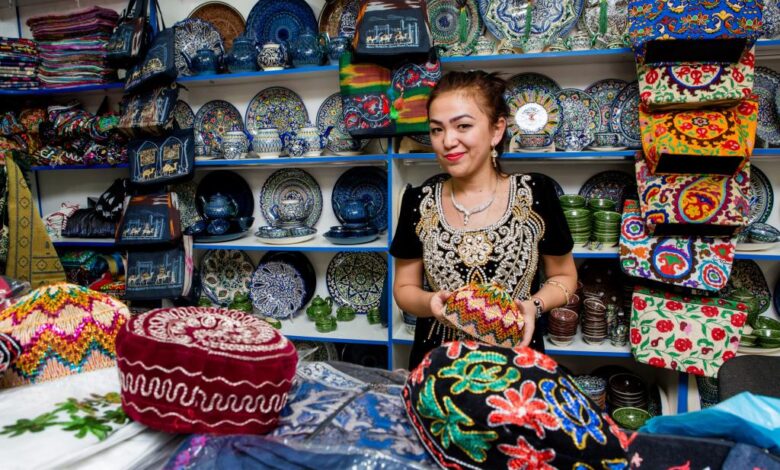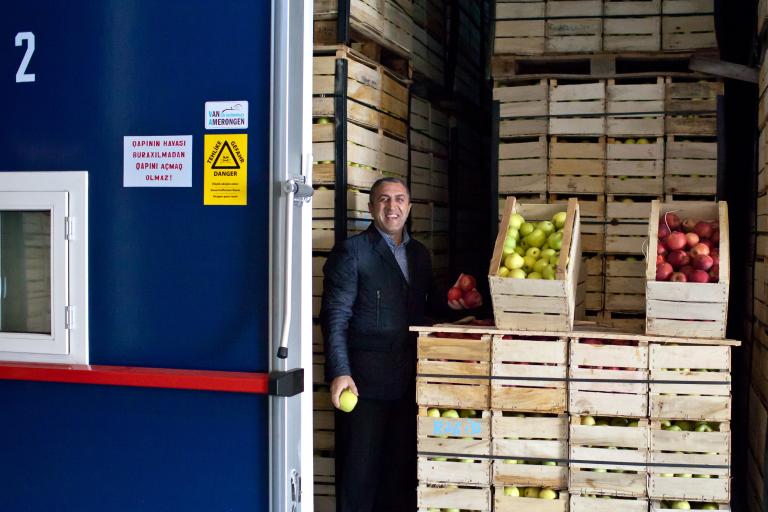Q&A: How Can Fintech Close the Finance Gap for the Region’s Smallest Businesses?

The significance of the smallest businesses in Asia and the Pacific belies their size. In many countries they form the backbone of the economy, and employ most of the labor force. These micro, small and medium-sized enterprises (MSMEs) are a particularly important way for women to earn incomes, often providing finance for their own and their children’s education and healthcare.
Despite their central role in the wellbeing of economies and families, many of these businesses face severe difficulties obtaining the finance and credit they need to grow. The COVID pandemic made this challenge even more acute, making it hard for potential small businesses to begin and existing ones to expand operations, enhance product offerings, or enter new markets. This leaves families worse off, and harms job creation.
Lotte Schou-Zibell
Advisor, Finance Sectors Group
Asian Development Bank
Lotte Schou-Zibell, an Advisor, Finance Sectors Group at the Asian Development Bank, explains how smart fintech solutions can help MSMEs at all stages of their evolution, with compelling benefits as well for any economy’s ability to create jobs and lift incomes for the neediest communities.
What are the main challenges for MSMEs in the Asia-Pacific in terms of finance and access to credit?
Image

Approximately 90% of enterprises in the Asia and the Pacific, both formal and informal, are MSMEs, which serve as the region’s economic backbone. They foster local resilience, add to economic diversity, stimulate domestic demand, create jobs, innovate, and compete on national and potentially regional levels.
The characteristics of MSMEs differ significantly across various parts of the region. For instance, Central Asia and the Pacific are dominated by agrarian-based MSMEs, East Asia by industrialized manufacturing, and South Asia by service-oriented enterprises.
Banking preferences also vary; for example, Pacific banks tend to maintain higher liquidity levels and often choose to invest in liquid assets like government securities instead of extending credit to MSMEs. The Pacific region’s legal and regulatory frameworks are generally underdeveloped, posing additional challenges for MSMEs seeking credit for expansion.
Access to finance and markets is critical to the growth of MSMEs. Traditionally, MSMEs in the region excel in sectors like wholesale, retail, agribusiness, food processing, and other service-related industries. However, they frequently encounter difficulties securing financing, limiting their potential to expand or hire more employees.
Challenges faced by MSMEs in accessing financial tools and credit include a lack of collateral, insufficient credit history, and the complexity of financial products that may not meet their specific needs. Financial information asymmetry, stringent regulatory requirements, and the high costs associated with processing small loans further complicate access to finance.
The limited geographical reach of financial institutions, particularly in rural or underdeveloped areas, restricts access to financial services. Women-owned or led businesses face additional cultural and institutional barriers.
Recognizing these issues, there is increasing acknowledgment of the importance of developing financial policies and products tailored to MSMEs’ unique needs. This includes embracing fintech solutions that offer alternative credit assessment methods and more flexible financial services.
How do these challenges affect their growth?
Image

Limited access to finance and credit significantly hampers the growth of MSMEs in Asia and the Pacific. This restriction curtails their ability to expand operations, enhance product offerings, or enter new markets, directly impacting their operational capacity—particularly for those with fluctuating revenue, which complicates cash flow management. Furthermore, inadequate funding prevents MSMEs from embracing innovation and new technologies, which are essential for staying competitive in the market. This stunts the growth of individual MSMEs and affects the region’s economic health and technological progress.
Additionally, job creation, a critical function of MSMEs, is adversely affected due to insufficient financing. Expansion and scaling, often reliant on credit, are vital to generating employment opportunities. Thus, constrained growth can lead to limited job prospects. Access to credit is also essential for MSMEs to develop resilience against economic and environmental disruptions. Without sufficient financial resources, these businesses are more vulnerable to crises, leading to business failures and broader economic instability.
Addressing these financial barriers is crucial for fostering sustainable economic development and achieving long-term goals in the region. Enhancing access to finance for MSMEs is essential for promoting robust economic growth and stability across the region.
How are MSMEs changing, and how can financial services providers meet their needs?
This evolving landscape demands a comprehensive approach from financial service providers to support MSME digitalization, provide customized financial products, improve access to credit, and assist MSMEs in integrating into broader markets
MSMEs in the region are navigating significant transformations as they recover from the global COVID pandemic and adjust to a new economic reality. The pandemic accelerated fintech adoption, which proved crucial for many MSMEs to stay afloat by providing quicker, more efficient, and cost-effective financial services than traditional banking. This shift has supported business continuity and spurred resilient growth through increased domestic demand, job creation, and innovation across various sectors.
Innovations in financial technology and digital payments are critical in enhancing MSME access to finance and supporting the achievement of Sustainable Development Goals. There is a recognized need to upgrade digital infrastructure to facilitate MSMEs’ transition to digital business models, ensuring they have access to advanced digital tools and services. Moreover, expanding access to financing is essential. MSMEs in the region often struggle to secure funding due to insufficient collateral, lack of credit history, or unavailability of appropriately designed financial products.
Financial service providers can play a transformative role by creating tailored financial products that utilize fintech solutions for more accurate credit assessments and offer microfinance options that suit the needs of smaller enterprises. This might include services like mobile banking and e-commerce platforms. For instance, in Thailand, Kasikornbank and Grab have collaborated to introduce GrabPay, a mobile wallet initiative. Similarly, Bank Rakyat Indonesia (BRI) has partnered with Alipay to enhance mobile payment options for Chinese tourists in Indonesia.
This evolving landscape demands a comprehensive approach from financial service providers to support MSME digitalization, provide customized financial products, improve access to credit, and assist MSMEs in integrating into broader markets. Such efforts are vital for fostering sustainable and inclusive growth in the post-COVID-19 era in Asia and the Pacific.
What is the role of fintech firms in helping MSMEs access finance for growth?
Fintech firms are essential to enhance the growth and resilience of MSMEs throughout Asia and the Pacific, especially in areas where traditional banking is less accessible. These companies have transformed MSME financing by prioritizing cash flow-based over asset-backed lending, which is crucial for businesses lacking substantial physical assets. For example, Capital Float in India rapidly provides collateral-free loans based on real-time cash flow analysis, helping MSMEs quickly leverage growth opportunities.
Digital lending platforms accelerate the process of assessing creditworthiness using algorithms and data analytics, facilitating quicker loan approvals with more relaxed criteria. Moreover, fintech enables MSMEs to effectively participate in global and regional markets, boosting their competitiveness. This is supported by digital platforms that assist with business registration, market access, and integration into global value chains. Digital payment solutions such as PayPal and Alipay transform business transactions, enhancing cash flow management and allowing for expansion into international markets.
Fintech also offers crucial tools for financial management, enabling better decision-making for MSMEs. The sector has been pivotal in promoting financial inclusion, significantly during the COVID-19 pandemic, by helping businesses continue operations and empowering women entrepreneurs with easier access to financial services.
Image

Fintech includes regulatory technology, or RegTech, solutions that help businesses navigate the often complex regulatory environments in which they operate and comply with regulations efficiently. This is especially important in regions with stringent financial regulations, as non-compliance can lead to heavy penalties. RegTech, including solutions like RegGenome, is vital to help businesses navigate complex regulatory landscapes and comply with regulations. RegGenome uses GenAI-optimized data and Large Language Models (LLMs) to streamline compliance processes, manage regulatory risks sustainably, and keep up with regulatory changes without extensive legal expertise.
In the realm of insurance technology, or Insurtech, fintech tailors products that utilize advanced technologies to meet the specific needs of MSMEs, which is critical as sectors like agriculture face the impacts of climate change across Asia and the Pacific.
By leveraging these advanced technologies, fintech firms not only support the operational needs of MSMEs but also empower them to scale and compete effectively in markets previously dominated by larger corporations. This integration of technology and finance is crucial for the ongoing growth and innovation of MSMEs in the region, ensuring they remain competitive and resilient.
How is the digitalization of banking changing the sector?
The digitization of banking tools is transforming the MSME sector in Asia and the Pacific by making financial services more accessible and fostering innovative business practices. This transformation is evident in how MSMEs increasingly utilize digital platforms for operations, transactions, and customer engagement.
As digital banking becomes more prevalent, a large majority of consumers prefer online and mobile banking over traditional branch visits, prompting banks to improve their digital offerings and incorporate AI and machine learning to enhance customer service and product offerings. This digital-first strategy boosts customer interaction and increases banks’ operational efficiency and competitiveness.
In the Philippines, the surge in e-commerce and digital platforms significantly drives the digital transformation of MSMEs. Government and private sector partnerships are pivotal in this shift, as they provide digital literacy programs and technological resources to help MSMEs expand their market presence and enhance operational efficiency. With e-commerce expected to grow substantially by 2025, MSMEs are poised to become more competitive in a digital-first market.
Indonesia offers another example where the government has partnered with major technology firms to promote digital tools specifically designed for small businesses, especially in the food and beverage sector, through platforms like GrabMerchant. Social media and mobile commerce have also become essential channels for these businesses, with ongoing initiatives to enhance MSME resilience and digital capabilities. However, challenges like uneven digital literacy and geographical barriers must be overcome to ensure effective digital adoption across all regions.
In Cambodia, the Bakong system promotes financial inclusion among the unbanked and financially excluded MSMEs through a mobile payment and banking app that offers interoperability among e-wallets, mobile payments, online banking, and payment apps. This initiative has created a comprehensive payment platform that integrates a vast network of local banks and financial institutions, facilitating seamless peer-to-peer transfers and enabling MSMEs to manage sales more effectively through electronic payments in an increasingly digital environment.
These instances underscore the significant impact of digital banking tools on the MSME sector, promoting financial inclusion and innovative practices crucial for the ongoing growth and competitiveness of MSMEs in Asia and the Pacific.
Are AI and cloud services prominent among MSMEs?
Image

AI and cloud services are increasingly being utilized by MSMEs in Asia and the Pacific, enhancing customer service, risk management, and operational efficiency. The vast potential of these technologies is being harnessed to drive business efficiency, scalability, and innovation.
In the Philippines, the adoption of cloud services is accelerating, and this is supported by government policies and the growing availability of affordable solutions. A notable example is Cantilan Bank, which, with support from the Asian Development Bank and Oradian has implemented cloud-based technology to enhance its financial services and extend them to the unbanked and underserved in remote areas. This demonstrates the transformative impact of cloud services in regions with limited traditional banking infrastructure.
The pandemic underscores the importance of digital transformation, which led to many MSMEs shutting down, highlighting the necessity of digital adaptation for survival and competitiveness. With the Philippine government reinforcing its “cloud-first” policies initiated in 2017, a significant shift towards cloud adoption is evident.
Cloud services also offer enhanced cybersecurity, which is a vital benefit as 57% of Philippine MSMEs experienced costly cyberattacks in 2023. Cloud solutions provide robust security features at cost-effective prices and are inherently resilient to physical disasters since they do not rely on on-site servers.
AI is revolutionizing customer interaction within financial services by facilitating data-driven, personalized services. AI-powered chatbots and virtual assistants offer 24/7 customer support, handling various inquiries efficiently and reducing operational costs. Robotic Process Automation (RPA) is being employed to automate repetitive tasks such as loan processing and claims management, minimizing human error and boosting efficiency.
Furthermore, AI is critical in enhancing compliance and fraud detection by analyzing transaction data to identify and flag suspicious activities, thereby improving Anti-Money Laundering efforts and overall regulatory adherence.
AI’s capability to analyze both structured and unstructured data supports better credit risk assessment, allowing financial service providers to manage risks more effectively. For instance, AI algorithms that analyze market data and social media help to make informed investment and trading decisions.
As these technologies become more accessible and awareness among MSMEs increases, their adoption is expected to rise, enhancing the competitive and operational capabilities of businesses in the region. However, challenges such as the initial costs of technology adoption, the learning curve associated with new technologies, concerns over data security, and the need for reliable internet connectivity can hinder broader implementation. Nonetheless, with appropriate human oversight and governance, the benefits of AI and cloud services can significantly outweigh these challenges.
How can these technologies help MSMEs grow their business?
Image

AI and cloud technologies are significantly boosting the capabilities of MSMEs to grow and stay competitive. These advancements streamline operations, enhance customer interactions, and improve decision-making. Here’s how these innovations are supporting MSME development:
AI-powered chatbots deliver 24/7 customer service, efficiently managing queries, and reducing the need for large customer service teams. These chatbots handle everything from order inquiries to providing product information, thereby boosting customer satisfaction and loyalty.
AI also plays a crucial role in enhancing credit risk assessments by analyzing both traditional and non-traditional data sources. This helps MSMEs make more informed lending decisions, manage credit risks more effectively, and potentially reduce default rates by evaluating data like customer behavior and social media activity to create detailed risk profiles.
Cloud computing and AI enable the automation of repetitive tasks such as accounting, payroll, and inventory management. This allows MSMEs to utilize sophisticated tools without substantial upfront investments in IT infrastructure, thus reducing operational costs and focusing resources on core business activities.
Additionally, AI aids in fraud detection by analyzing transaction patterns to identify anomalies. This is particularly crucial for e-commerce businesses that are more susceptible to payment fraud. AI systems highlight unusual transactions for further investigation, helping protect both revenue and business reputation.
AI tools also process large datasets to glean insights on market trends and consumer behavior, empowering MSMEs to make strategic decisions, tailor marketing efforts, and discover new market opportunities. For example, retailers can use AI to track the most popular products and adjust inventory accordingly to maximize sales.
In regions with significant unbanked populations, such as rural areas in the Philippines, cloud-based banking services like those provided by Cantilan Bank have made financial services more accessible to MSMEs, facilitating their growth and sustainability.
By leveraging AI and cloud technologies, MSMEs can compete on equal footing with larger companies, enabling them to innovate and expand in ways previously not feasible. These technologies enhance MSMEs’ agility, efficiency, and customer engagement, propelling them toward success in an increasingly digital marketplace.
How can fintech firms help scale up B2B payments in the region?
Fintech firms are revolutionizing B2B payments in Asia and the Pacific by digitizing payment processes and enhancing cross-border capabilities, which are vital for the growth of MSMEs. A key example is the partnership between Visa and SAP, which integrates payment systems into SAP’s Business Technology Platform to accelerate B2B transactions across regional supply chains. This initiative is particularly beneficial for smaller businesses that lack the resources to digitalize payment acceptance and are critical in closing the supply chain capital gaps in the region.
Linkages like the one between Singapore’s PayNow and Thailand’s PromptPay facilitated by the Monetary Authority of Singapore are also pivotal. They enable instant cross-border transactions using just a mobile number, significantly cutting down wait times and improving cash flow management for MSMEs involved in international dealings.
However, digitalizing cross-border B2B payments poses challenges, primarily in terms of trust and cost. High compliance costs across the different regulators in Asia and the Pacific make scaling difficult. In contrast, in the European Union, a single license allows expansion across the countries, simplifying market entry.
In regions like Indonesia and the Philippines, where traditional banking can be cost-prohibitive, alternative payment solutions such as e-wallets and mobile wallets are becoming prevalent. These platforms provide essential services to areas underserved by traditional banks.
Overall, these fintech innovations modernize business transactions and expand MSMEs’ operational scope and market reach, fostering greater global competitiveness and operational efficiency.
How are regional regulators enabling the efficient development of fintech for MSMEs?
Ensuring the sustainability of MSMEs through adequate governmental support and accessible financing is crucial for inclusive economic growth. Regulators across Asia and the Pacific increasingly recognize the need to promote fintech innovations to assist MSMEs while safeguarding financial stability and consumer protection. To this end, several countries have adopted regulatory sandboxes, allowing fintech companies to test and refine their services within a controlled environment.
Singapore was an early starter in this area, establishing its regulatory sandbox in 2016. This model permits fintech startups to experiment with new technologies in real-world settings without full regulatory compliance, facilitating rapid development and testing while maintaining regulatory oversight.
Similarly, Malaysia and Thailand have implemented frameworks that encourage fintech solutions aimed at expanding financial services to underserved parts of the economy, including MSMEs. These sandboxes have proven crucial in allowing the launch of various fintech services, such as digital payments and alternative lending, tailored specifically to the needs of MSMEs.
In the Philippines, the regulatory landscape has particularly supported digital banking and payment systems, which have grown substantially due to efforts to enhance financial inclusion. The Bangko Sentral ng Pilipinas (BSP) has granted several digital banks Certificates of Authority, creating a competitive environment that benefits both consumers and businesses, including MSMEs.
These initiatives demonstrate a commitment to fostering a regulatory environment that balances innovation with risk management, ensuring that fintech developments benefit both MSMEs and the wider economy without compromising the financial system’s integrity.



